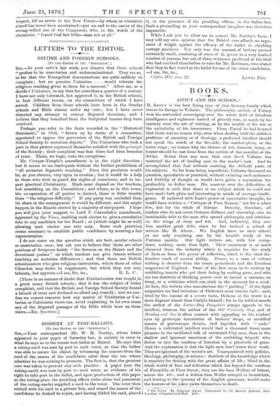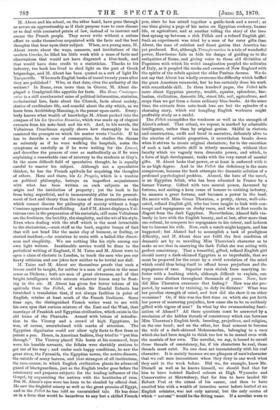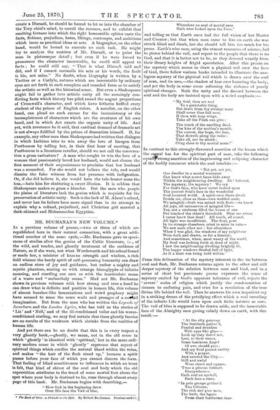BOOKS.
ABOUT AND HIS SCHOOL.*
M. ABOUT is the best living type of that literary family which traces its lineage to Voltaire. The philosophic satirist of Ferney won his unrivalled sovereignty over the whole field of frivolous intelligence and righteous hatred of priestly rule, as much by his mastery over the art of writing, as by the wealth of his wit or the catholicity of his irreverence. From Pascal he had learned that there was no reason why, even when dealing with the subtlest problems of casuistry or of theology, a profound intellect should not speak the words of the fire-side, the market-place, or the comic stage ; no reason why the charms of wit, humour, irony, or banter should be cast loose from the service of the moralist or the divine. Better than any man that ever lived Voltaire has mastered the art of lending ease to the reader's task. And he accomplished that feat without omitting the difficult parts of his subjects. So far from being superficial, Voltaire discussed no question, speculative or practical, without evincing such acuteness and fertility of thought as would have given a reputation for profundity to duller men. His mastery over the difficulties of expression is such that there is no subject which he could not have made both plain and interesting to minds of average intelli- gence. If endowed with Kaut's power of speculative thought, ho would have written a " Critique of Pure Reason," not for a select few, but for the whole of Europe. Directly, therefore, all readers who do not covet German dullness and obscurity, owe an inestimable debt to the man who spread philosophy and criticism on the wings of story and wit. And, indirectly, they owe him another great debt, since he has trained a school of writers like M. About. We English have no such school, or are only acquiring one by the humble study of the Parisian models. Our light writers are, with few excep- tions, nothing more than light. Their smartness is as much divorced from the industry which is requisite for the study of facts as from the power of reflection, which is the chief dis- tinctive mark of mental ability. Hence, to a man of culture nothing is drearier than the comic periodicals and the frivolous magazines of England. Some of the first seem to be written by scribbling insects who get their living by making puns, and who are too destitute of thinking power ever to invent a sarcasm, an irony, or a witticism which can stick in the memory for a week. At best, the writers who manufacture the " padding" of the light magazines are bad imitators of Dickens's most vicious style ; and, tried by the canons of a severe taste, Dickens at his worst is a more flagrant sinner than Carlyle himself ; for in his wildest moods the author of the Latter-Day Pamphlets always appeals to the intellect, whereas the author of the Old Cariosity Shop and of Dombey and Son is often content with appealing to his readers' eyes by grotesque inventories of brokers' shops, or muddled masses of picturesque details, tied together with " ands." Hence a cultivated intellect would find a thousand times more pleasure in the undiluted talk of untutored City men, than in the shallow and ignorant smartness of the scribbling brigade who drives us into the confines of boredom by a plenitude of grins. And the explanation is that the light men don't know their work. They are ignorant of the writer's art. Unacquainted with politics, theology, philosophy, or science ; destitute of the knowledge which is requisite for dealing with the great affairs of life ; blind to the whole world of fact and reflection which lies beyond the confines of Piccadilly or Fleet Street ; they are the Sam Wellers of letters, minus the wit ; and a witless Sam Weller arrayed in broadcloth, and bowing to the tyranny of the English grammar, would make the hearers of his jokes yawn themselves to death.
• The Fdlah. By Edmond About. Translated by Sir Randal Roberta, Bart London: Chapman and Hall. 1870.
M. About and his school, on the other hand, have gone through as severe an apprenticeship as if their purpose were to cure disease or to deal with contested points of law, instead of to instruct and amuse the French people. They never write without a serious effort to make themselves acquainted with the facts and the best thoughts that bear upon their subject. When, as a young man, M. About wrote about the ways, manners, and institutions of the modern Greeks, he filled his little work with a mass of facts and observations that would not have disgraced a blue-book, and that would have done credit to a statistician. Thanks to his industry, the book has lived to shed light on the pest of Greek brigandage, and M. About has been quoted as a sort of light De Tocqueville. Who reads English books of travel twenty years after they are published ? Who, at that date, cites the authority of the writers? In Rome, even more than in Greece, M. About dis- played a Gradgrind-like appetite for facts. His Rome Contempo- raine is a still unexhausted mine of political information, statistics, ecclesiastical lore, facts about the Church, facts about society, stories of cardinalate life, and scandal about the city which, as we learn from Archbishop Manning, is the purest upon earth. Every- body knows what wealth of knowledge M. About packed into the compass of his La Question Romaine, which was made up of elegant extracts from his note-book and his wit. And, in his novels, the Voltairean Frenchman equally shows how thoroughly he has mastered the precepts on which his master wrote Candide. If he has to describe a case of consumption, he studies the disease as minutely as if he were walking the hospitals, notes the symptoms as carefully as if he were writing for the Lancet, and describes the process of cure as methodically as if fie were explaining a remarkable case of recovery to the students at Guy's. In the more difficult field of speculative thought, he is equally careful to master his subject. Although not a speculative thinker, be has the French aptitude for acquiring the thoughts of others. Here and there, his Le Progres, which is a treatise on political philosophy, betrays an imperfect acquaintance with what has been written on such subjects as the origin and the institution of property ; yet the book is far from being superficial, and is immeasurably abler in its present- ment of fact and theory than the mass of those pretentious works which cannot discuss the philosophy of society without a huge Comtean apparatus of scaffolding. And if M. About displays a Vol- tairean care in the preparation of his materials, still more Voltairean are the liveliness, the lucidity, the simplicity, and the wit of his style. Even when dealing with the stuff which is the most intractable to the rhetorician,—such stuff as the hard, angular lumps of fact that will not bend like the moist clay of humour, or feeling, or storied incident,—he contrives to write with a ballad-like direct- ness and simplicity. We see nothing like his style among our own light writers. Inestimable service would be done to the periodical writing of England, if M. Taine and M. About were to open a class of rhetoric in London, to teach the men who pen our heavy criticism and our jokes how neither to be trivial nor dull.
M. Taine and M. About are themselves proofs that such a lesson could be taught, for neither is a man of genius in the same sense as Dickens ; both are men of great cleverness, and of that bright intelligence which mirrors whatever lesson may be float- ing in the air. M. About has given few better tokens of his aptitude than the Fellah, of which Sir Randal Roberts has furnished a translation that, if not always faultless in point of English, retains at least much of the French liveliness. Some time ago, the distinguished French writer went to see with his own eyes that curious mixture of the East and the West, that marriage of Frankish and Egyptian civilization, which exists in the old home of the Pharaohs. Armed with letters of introduc- tion to the Viceroy and a crowd of high Egyptians, he was, of course, overwhelmed with marks of attention. The Egyptian dignitaries could not allow ugly facts to flow from so potent a pen. Hence, in American fashion, they tried to " put him through." The Viceroy placed Nile boats at his command, boys were his humble servants, the fellahs were slavishly anxious to get out of his way ; and under such happy conditions, he saw the great river, the Pyramids, the Egyptian towns, the native dinners, the outside of many harems, and that strangest of all institutions, the race-course, in which English civilization plants its advanced guard of blackguardism, just as the English trader goes before the missionary and prepares subjects for the healing influence of the Gospel, by acquainting the natives with the beatitudes of ruin. But M. About's eyes were too keen to be clouded by official dust. He saw the frightful misery as well as the great promise of Egypt, and in the Fellah he has told an unvarnished tale. He has done so in a form that would be hazardous to any but a skilled French pen, since he has mixed together a guide-book and a novel ; at one time giving a page of his notes on Egyptian cookery, bazaar life, or agriculture, and at another telling the story of the love that sprang up between a rich Fellah and a refined English girl. Such an experiment was tried by a man of far rarer gifts than About, the mau of subtlest and finest genius that America has yet produced. But, although Transformation is a tale of wonderful power, Hawthorne fails to hide his design of guiding us to the antiquities of Rome, and giving voice to those old divinities of Paganism with which his weird imagination peopled the solitudes of Italy, as it peopled the nooks and corners of New England with the spirits of the rebels against the older Puritan decrees. We do not say that About has wholly overcome the difficulty which baffled the great American romancist, but he has certainly done his work with remarkable skill. In three hundred pages, the Fellah tells more about Egyptian poverty, wealth, squalor, splendour, bar- barism, civilization, domestic life, street life, soil, agriculture, and crops than we get from a dozen ordinary blue-books. At the same time, the extracts from note-book lore are but the episodes of a charming story, which our bungling English workmen might profitably study as a model.
The Fellah exemplifies the weakness as well as the strength of About's school. That school, we repeat, is marked by admirable intelligence, rather than by original genius. Skilful in rhetoric and construction, swift and lucid in narrative, delicately alive to the niceties of artistic proportion, it nevertheless breaks down when it strives to create original characters; for in the execution of such a task artistic skill is utterly unavailing, without that faculty which we vaguely term dramatic power, and which, in a form of high development, ranks with the very rarest of mental gifts. M. About lacks that power, or at least is endowed with it in no high degree. And in the Fellah the deficiency is the more conspicuous, because the book attempts the dramatic solution of a profound psychological problem. Ahmed, the hero of the novel, is an Egyptian fellah, who has been educated in France by a former Viceroy. Gifted with rare mental power, favoured by fortune, and uniting a keen sense of honour to untiring industry, he amasses a great fortune, and becomes a power in the land. He meets with Miss Grace Thornton, a pretty, clever, well-edu- cated, refined English girl, who has been taught to look with con- tempt and repugnance on dusky races, and who at first recoils in disgust from the dark Egyptian. Nevertheless, Ahmed falls vio- lently in love with the English beauty, and at last, after more than one refusal, he conquers her repugnance to his colour, and induces her to become his wife. Now, such a result might happen, and has happened ; but Ahmed had to accomplish a task of prodigious difficulty, and M. About does not fulfil the first condition of dramatic art by so unveiling Miss Thornton's character as to make us see that in marrying the dark Fellah she was acting with perfect consistency. That a beautiful, gifted, refined English girl should marry a dark-skinned Egyptian is so improbable, that we must be prepared for the event by a vivid revelation of the mind which could thus bring itself to offend home prejudices and the repugnance of race. Superior races shrink from marrying in- ferior with a loathing which, although difficult to explain, can keep races distinct throughout thousands of years. Now, how did Miss Thornton overcome that feeling ? How was she pre- pared, by nature or by training, to defy its dictates? What was her peculiar strength of mind, and how did she show it on other occasions? Or, if this was the first time on which she put forth her power of mastering prejudice, how came she to be so suddenly gifted with vigour of soul ? In what lay the overmastering fasci- nation of Ahmed ? All these questions must be answered by a revelation of the hidden threads of consistency which ran between Miss Thornton's English birth, breeding, prejudices, and religion, on the one hand ; and on the other, her final consent to become the wife of a dark-skinned Mohammedan, belonging to a race which she had been taught to think too low to be mated even with the menials of her own. The novelist, we say, is bound to unveil those threads of consistency, for, if his characters be real, those threads must exist. No one does act inconsistently with his real character. It is mainly because we see glimpses of men's character that we call men inconsistent when they deny in one week what they said in the week before. Did we, for example, know Mr. Disraeli as well as he knows himself, we should find that for him to have hoisted Radical colours at High Wycombe and Conservative at Shrewsbury, that for him to have lauded Sir Robert Peel at the outset of his career, and then to have assailed him with a wealth of invective never before hurled at an English minister, was not only natural, but the only course of which " natural" would be the fitting name. If a novelist were to
create a Disraeli, he should be bound to let us into the chamber of the Tory chief's mind, to unveil the recesses, and to exhibit that smelting furnace into which the right honourable sphinx casts the facts, fictions, prejudices, hates, likings, contempts, and ambitions which issue as practical ideas or acts. A biographer, on the other hand, would be bound to execute no such task. He might try to analyze the motives of Mr. Disraeli, or to paint the man in picturesque detail ; but even if he were forced to pronounce the character inscrutable, he could still appeal to facts ; he could still say, " That is what Disraeli said and did, and if I cannot reconcile his acts or his words, the fault is his, not mine." No doubt, when biography is written by a Tacitus or a Carlyle, natures which are inscrutable by ordinary eyes are set forth in such complete and rounded form as to satisfy the artistic as well as the historical sense. But even a Shakespeare might fail to gather into artistic unity all the seemingly con- flicting facts which history has piled round the august proportions of Cromwell's character, and which have hitherto baffled every student of the prince of English rulers. A novelist, on the other hand, can plead no such excuse for the inconsistency or the incompleteness of characters which are the creatures of his own hand, and in which Art exacts the organic unity of life. And yet, with reverence be it said, that cardinal demand of dramatic art is not always fulfilled by the prince of dramatists himself. If, for example, any other man than Shakespeare had written that dialogue in which Iachimo tries to win away the love of Imogen from Posthumus by telling her, in their first hour of meeting, that Posthumus is a licentious reveller, should we not call the conversa- tion a gross caricature? A man who sought to win the love of a woman that passionately loved her husband, would not choose the first moment of their acquaintance to proclaim that her husband was a scoundrel. For she would not believe the tale, and would dismiss the false witness from her presence with indignation. Or, if she did believe it, she would hate the tale-bearer none the less,—hate him for shattering a sweet illusion. It is seldom that Shakespeare makes so gross a blunder. But the men who people the plains of literature lack the genius which is requisite for the preservation of artistic unity. Such is the lack of M. About's school, and never has its failure been more signal than in its attempt to explain why a refined, prejudiced, and Christian girl married a dark-skinned and Mohammedan Egyptian.






























 Previous page
Previous page